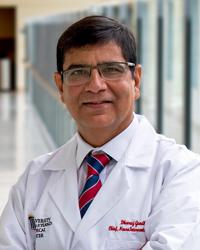
Dheeraj Gandhi, MD, FACR
Diagnostic Radiology
Professor of Diagnostic Radiology & Nuclear Medicine, Neurology, and Neurosurgery, Vice Chair of Academic Affairs, Director of Neurointerventional Surgery, Clinical Director, Center for Metabolic Imaging and Therapeutics (CMIT)

UM Faculty Physicians, Inc.
Languages: English, Hindi
Gender: Male
Locations
PH: 410-328-5052
UMM Neurosurgery UM Medical Center
22 South Greene StreetSuite S-12-D
Baltimore, MD 21201 Get Directions
PH: 410-328-6034
FAX: 410-328-0756
About Me
Dr. Gandhi's work centers on treating cerebrovascular disease (conditions that affect blood flow to and blood vessels in the brain), including brain aneurysm, stroke, idiopathic intracranial hypertension and complex vascular malformations. In caring for patients, he blends his clinical expertise with innovative technical advances. He remains committed to helping patients and their families understand diseases and options for therapy and helping all the way through the recovery process.
A quote from legendary writer and humorist Mark Twain inspires Dr. Gandhi's approach to patient care: "The two most important days in your life are the day you are born and the day you find out why." Dr. Gandhi says his "why" is very clear: to strive each day to make a difference in the patient outcomes and contribute to the field of medicine.
Dr. Gandhi has received numerous accolades, including the prestigious Magna Cum Laude and Summa Cum Laude awards from the American Society of Neuroradiology (ASNR), outstanding presentation awards for 2023 and 2024 (ASNR: Interventional), and a Certificate of Merit from the Radiological Society of North America.
In addition to his role in patient care, Dr. Gandhi is professor of radiology, neurology and neurosurgery and serves as vice chair of academic affairs and director of neurointerventional surgery at University of Maryland School of Medicine. He plays an important role in training the next generation of medical professionals. He takes great pride in guiding his residents and fellows to success. Many of them have gone on to win prestigious national awards. He helped establish two of the only six fellowships in neurointerventional surgery accredited by the Accreditation Council for Graduate Medical Education (ACGME).
